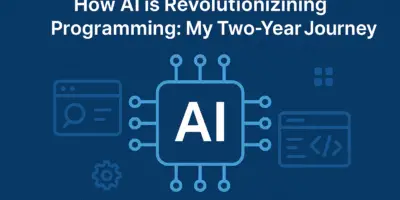So you’ve decided to learn programming but have no idea where to start. Trust me, I get it. One of the most common questions I receive is: “Which programming language should I learn first?” It’s a total maze out there, with everyone claiming their preferred language is the best. Let’s cut through the noise and break down the major programming languages that are actually worth your time in 2025.
Table of Contents
The Foundational Languages
C – The Mother of All Languages
C is basically the grandmother of modern programming. It’s old-school, but don’t let that fool you—it’s still incredibly relevant. If you want to understand how computers actually “think,” C is your language.
What’s it used for? Operating systems like Windows and Linux are partly built with C. It’s the bare-metal stuff. Learning C is like understanding the entire engine of a car, not just how to drive it. It’s fundamental.
Is it for beginners? Honestly, probably not. But if you’re the type who needs to understand things from the ground up, go for it.
C++ – For When Speed Matters
Built on top of C, C++ is the go-to language for performance-intensive applications. If you’ve ever played a video game with stunning graphics or used a physics simulation, chances are it was built with C++.
This language shines when efficiency is non-negotiable—when you need something lightning-fast that efficiently uses your hardware. Game development, graphics processing, and simulations are where C++ dominates.
The learning curve? Steep, but worth it if you’re heading into gaming or performance-critical applications.
Java – Jack of All Trades
Java might just be the most recognizable programming language out there. It’s incredibly flexible—you can use it for pretty much anything. From backend web applications to Android apps before Kotlin became popular, Java has been a reliable workhorse for decades.
What makes Java special is its “write once, run anywhere” philosophy. Code written in Java can run on any device with a Java Virtual Machine, making it incredibly portable.
It’s not as simple as Python, but it’s more structured. If you’re working on a large project with a team, Java’s strictness can actually be a blessing—it helps keep everyone’s code compatible.
Web Development Languages
JavaScript – Making Websites Come Alive
Ever visited a website that felt more like an interactive app than a static page? That’s JavaScript at work. It’s what makes websites dynamic and responsive.
Originally designed for browser-based applications, JavaScript has grown up. With Node.js, it’s now used for server-side programming too, making it more efficient than ever. If you’re interested in web development, you simply can’t avoid JavaScript—it’s essential.
TypeScript – JavaScript with Guardrails
Think of TypeScript as JavaScript’s more responsible sibling. It looks almost identical but adds type checking to help catch errors before they happen. This makes your code cleaner and more maintainable, especially for larger projects.
Microsoft developed TypeScript, and it’s gained massive popularity among developers who love JavaScript but want fewer surprises when their code runs.
PHP – The Backend Veteran
PHP powers the backend of countless websites. It’s server-side, meaning it runs on the web server and sends the final product to your browser.
While it’s incredibly common in academic settings (if you’re studying IT, chances are you’ll encounter PHP), it’s becoming less popular in new projects. Do I recommend learning it now? Not really, unless you’re specifically working with legacy systems or WordPress.
Data Science and Analysis
R – The Statistician’s Friend
R is laser-focused on numbers and statistics. If you’re working with data analysis, statistical modeling, or need to visualize trends in your data, R is purpose-built for these tasks.
It excels at creating graphs from your existing data and is heavily used in scientific research and by companies that rely on data-driven decision making.
SQL – Database Whisperer
SQL (Structured Query Language) isn’t a traditional programming language—it’s more of a query language for interacting with databases. But it’s absolutely essential if you’re working with data.
It’s used to store, organize, and retrieve information from databases. Think of an online store—all the product names, prices, and details are typically organized in a database using SQL. If you’re going into any field that deals with data (which is pretty much every field these days), SQL knowledge is invaluable.
Mobile App Development
Swift – Apple’s Pride and Joy
If you’re targeting iOS devices, Swift is your go-to language. Developed by Apple specifically to replace Objective-C, Swift is used to build modern iOS applications. It’s cleaner, safer, and more intuitive than its predecessor.
Kotlin – Android’s New Favorite
For Android development, Kotlin has become the preferred language. While you can still build Android apps with Java, Kotlin offers more efficiency and safety features. If Android development is your goal, Kotlin should be your focus.
Systems Programming
Rust – The Rising Star
Rust is the language that’s been catching my eye lately. It offers the power of C/C++ but with modern safety features and error handling. It’s designed to prevent crashes and eliminate common programming errors.
The learning curve is definitely there, but the payoff is huge—especially if you’re building systems that need to be both fast and secure.
Cross-Platform Development
Dart – Google’s Cross-Platform Solution
Created by Google, Dart is designed for building applications that need to run equally well on iOS and Android. It’s a cross-platform language that helps you avoid writing separate code for different operating systems.
If you want to build a mobile app that works seamlessly across platforms with a single codebase, Dart (usually with Flutter) is an excellent choice.
Automation and Scripting
Ruby – The Fun One
Ruby might be the most enjoyable language to work with. It’s elegant, intuitive, and reads almost like English. It’s primarily used for web applications through Ruby on Rails, a powerful framework that makes web development faster and more enjoyable.
PowerShell – The Windows Manager
I hesitate to call PowerShell a programming language—it’s more of a management language for automating tasks on your computer. If you find yourself repeatedly performing the same tasks manually on Windows, PowerShell can help automate them.
For example, if your job involves changing Windows settings or running multiple programs in sequence, a simple PowerShell script can do all of this automatically.
Game Development and Extensions
Lua – The Add-On Language
Lua functions more as an add-on to other languages rather than a standalone option. It’s commonly used in game development for smaller tasks—like controlling enemy movements or behaviors. Lua is excellent for these details, which is why it’s popular in game modding communities.
Don’t learn it as your main language, but it’s a great supplement if you’re already working in game development.
Specialized Languages
Haskell – The Mathematician’s Choice
Haskell is perhaps the most logical, mathematically pure language out there. If you think in terms of math and formal logic, you might love Haskell.
It’s challenging for beginners due to its complex syntax, but it’s excellent for solving problems that involve complex mathematical operations. It’s commonly used in research involving advanced mathematics.
My advice? Don’t start with Haskell if you’re new to programming. Learn another language first, then gradually explore Haskell if you’re interested.
Ada – When Failure Is Not an Option
Ever thought about what programming language might be used in airplanes, medical devices, or train systems? Ada is likely the answer. Its primary focus is preventing errors in systems where mistakes could be catastrophic.
Ada has extremely strict rules to prevent bugs and errors. The next time you board a plane, remember that your life depends partly on Ada doing its job perfectly.
Pascal – The Teacher
Pascal is an older language that I recommend if you want to understand programming concepts. You won’t build modern projects with it, but it teaches the logical thinking behind programming exceptionally well.
In short, use Pascal if you want to learn programming logic, but don’t expect to build anything current with it.
My Personal Favorite
Python – The Swiss Army Knife
Python might just be the most loved language by developers everywhere (including me—yes, I’m that annoying person who can’t stop talking about how much I love Python).
Like Java, Python can do almost everything. If your English is decent, it’ll help you tremendously with Python, as its syntax is remarkably readable. It’s easy to read, though not necessarily easy to master.
Python essentially allows you to make your computer your friend. Need to automate tasks like renaming hundreds of files? Python. Want to build a website backend? Python. Need to create a simple application but don’t want to use Java, Kotlin, or Swift? Use Python with Kivy.
Want to train a computer to recognize faces, cars, or any object? Python is your tool. In fact, about 95% of artificial intelligence development happens in Python.
Python’s weakness compared to languages like C and C++ is that it’s not low-level and doesn’t interact directly with hardware. This makes it significantly slower than those languages. However, Python’s strengths far outweigh this weakness, which is why I always recommend it for both beginners and advanced programmers.
Making Your Choice
Here’s the quick summary:
- For beginners: Python, Java, JavaScript, and TypeScript are excellent starting points. They’re versatile and can be used for almost anything.
- For mobile app developers: Focus on Swift and Kotlin.
- To understand computers at the fundamental level: C, C++, and Rust are your friends.
The worst thing you can do is spend all your time learning languages instead of building things with them. Don’t make the mistake of trying to learn them all—it’s a huge time sink. Look at your goals, your field of interest, and learn the language that best fits.
Remember, this post is just an introduction to programming languages, not an in-depth explanation. I’ve given you a brief overview of each language and what it’s typically used for, but most languages are flexible and can be used for various purposes—though each excels in specific areas.
The Reality of Professional Development
One important thing to note: you won’t rely on just one language if your project is medium to large in scope. You’ll use what’s called a “tech stack”—multiple programming languages and tools for different parts of your project. So once you learn one language, you’ll inevitably need to learn others.
My personal experience? I’ve focused on C# (unintentionally through Unity game development), Python (intentionally—I’ve studied everything Python-related from the ground up), and recently Rust. My knowledge of other languages is fairly surface-level, though in cybersecurity, you need to know a bit of everything.
Don’t stress too much about picking the “perfect” language. Just start somewhere that aligns with your interests, and the rest will follow naturally. The most important thing is to start building projects—that’s where the real learning happens.



